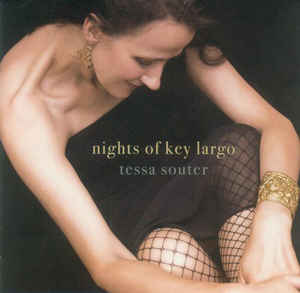 |
| Tessa Souter-Shadows and Silence- The Erik Satie Project-NOANARA |
The chanteuse Tessa Souter released her latest album Shadows and Silence- The Erik Satie Project on the NOANARA label on July 1,
2025. Having been a follower and fan of this stylistic vocalist, this may be
the best of her releases to date.
Souter’s theme is the artistry of the classical
composer/pianist Erik Satie, whose eccentric and minimalist approach to western
music may have been an inspiration to the subsequent modal jazz and ambient
music trends. Despite the influence to jazz and ambient genres, there is a
great deal of classical, albeit modern, influence on this record.
Souter has the soul of a lyricist, and it is on display in
spades on this album. She takes several songs from Satie-Gymnopedic No 1, No 2,
Vexations, and No 3, Gnossienne No 1, No 2, and No 3- and retitles them with lyrics. She pens
lyrics about love, loss, transience, fluidity, beauty and the futility of thinking
you can capture the ever-changing present, and peace. This thoughtful
compilation shows respect for the music of an artist whose work was so
influential. My first exposure was back in the early seventies, when I fell in
love with the Blood, Sweat, & Tears version of their Variations on Theme 1st
and 2nd movements from Gymnopedic No 1, as arranged by multi-instrumentalist
Dick Halligan and recorded by the jazz/rock band back in 1968.
On Souter’s version of this composition, she renames this
lyric version “Rayga’s Song,” in dedication to the birth of bassist Yasushi
Nakamura’s son, which happened during a snowfall. She is accompanied by Luis
Perdomo’s delicate piano work and Steve Wilson’s soaring soprano saxophone. Bassist
Nakamura’s plucky bass solo offers his own poignant comment. Souter’s lyrics and her sincere voice bring the element of hopeful love, to this piece that revels in the promise of a new life
into this otherwise haunting piece.
Satie’s Gnossienne No1 was retitled with lyrics as Souter’s “A
Song for You” (not to be confused by the Leon Russell song by the same name).
On this one Souter tells the story of a disguised lover who hides his true
intention and the effects it had on his befallen lover. Drummer Billy Drummond’s beat is
hypnotic, Perdomo’s piano is splendid and Nakamura’s bass throbs like a beating
heart.
Souter even knits in a song that recalls a Paul Gaugin
painting of the same name “Du’O Venons-Nous” based on Satie’s Gymnopedic No3, which
has some nice arco work by Nakamura and some airy soprano work by Wilson.
Clearly Souter’s exposure to Satie has been more studious
and rigorous then mine. But this is not exclusively a Satie album. Souter finds other excellent
pieces that seem to thematically weave into the fabric of this project seamlessly.
The Edith Piaf-inspired “Avec le Temps,”
a Leo Ferre composition that Souter sings in French, with both emotion and verve,
accompanied by Nakamura’s excellent bow and Perdomo’s crystalline piano.
Souter includes a Rod McKuen song, inspired by Jacques Brel
titled “If You Go Away.” She does as an intimate duo with Perdomo in the intro, before she kicks it up a notch for a moment with her vocal energy, as she injects a
cabaret feel. She follows with singing in French for a section before the trio takes the
music to another level, eventually Souter returns to that intimate duo at the coda.
Jazzers should appreciate the song “Never Broken (ESP)” a
collaboration written by vocalist Cassandra Wilson and saxophone/composer, legend
Wayne Shorter. Souter is at her most fluid here. The trio percolates with Perdomo
getting off on the zigzagging lines he introduces, as Nakamura and Drummond
lock in like a fine-tuned timepiece, with Drummond getting a little freedom to
offer some nice drum centric features on this one.
Perhaps one of my favorites is bassist Ron Carter’s “Mood,”
which Souter’s worded version is called “Musica Universalis.” Instrumentally,
this one includes a mesmeric metronomic beat that is laid down by Nakamura
and Drummond, before Perdomo adds his own leading piano lines. The real tonal treat
comes from Australian born New York-based Nadje Noordhuis’s moody muted
trumpet lines as they interweave with Wilson’s sinewy soprano work, that at times almost
sounds like a flute. The two show a great deal of magic and symbiosis when
playing together. Souter’s vocal spells out the enchanting lyrics “Mood is a
feather, just floating wherever, like change in the weather, all clouds in the
sky’… “Now waits for no man, it’s gone in a moment, Belonging to no one.” The lyrics nailing the transience, the
fluidity, the beauty and the futility of never being able to keep things more than
in the moment.
Tessa Souter's Shadows and Silence- The Erik Satie Project is a splendid album that you will find yourself revisiting many times.



